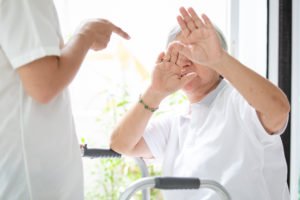
Abuse in elderly care facilities is a widespread problem, although it is challenging to accurately assess its prevalence because abuse is most likely underreported, according to the National Center on Elder Abuse (NCEA).
The Centers for Disease Control and Prevention (CDC) defines elder abuse as “an intentional act, or failure to act, by a caregiver or another person in a relationship involving an expectation of trust that causes or creates a risk of harm to an older adult.”
Senior citizens in nursing homes may suffer physical, sexual, emotional, and financial abuse. Although any person over age 60 can be a victim of abuse, according to the National Institute on Aging (NIA), some groups are more vulnerable than others. Women, socially isolated individuals, individuals with memory problems or dementia, and frail residents who depend on others for help with basic needs, such as eating and using the bathroom, are most at risk.
How Someone Can Abuse Seniors in Long-Term Care Facilities
Caregivers might physically abuse the elderly nursing home residents in their care. These residents also face the risk of being physically harmed by others who live in the facility. Physical abuse includes being pushed, hit, kicked, or otherwise harmed.
Staff members may administer unnecessary psychiatric medications to keep residents docile. Employees may withhold medical treatment, fail to provide residents with food, or refuse to help them eat it.
Sexual abuse in nursing homes can take many forms. It may include intercourse, inappropriate touching, watching, or recording an unclothed individual, forcing a resident to watch or participate in sexual acts, or verbal sexual harassment. Perpetrators of these acts could be staff members, fellow residents, or other people who come to the nursing home.
Nursing home employees sometimes emotionally abuse residents. They may yell or swear at seniors, call them names, make offensive or derogatory comments or threats, or intentionally humiliate patients in front of others. A lack of staff, stress, and low pay can contribute to different forms of abuse or neglect.
Elderly nursing home residents are particularly vulnerable to financial abuse. Many long-term care residents have spent their lives saving for retirement to accumulate the funds they need to live.
They may also have conditions such as Alzheimer’s or dementia that make it difficult or impossible for them to manage their own financial affairs. In addition, seniors in nursing homes may be isolated from their families and, therefore, form strong bonds with their caregivers.
Employees may exploit that trust to gain access to patients’ bank and retirement accounts, forge checks, change wills or insurance beneficiaries without permission, and use the money for their own purposes.
For a free legal consultation, call 800-712-9119
What to Do If You Suspect That Your Family Member Has Been Abused
Although getting definitive numbers is a difficult task, nursing home abuse is more common than many people realize. If you know what to look for, you might be able to detect signs of possible abuse.
If you have noticed physical injuries, such as bruises, cuts, or scrapes, they may be evidence of abuse. It is also possible that the injuries are the result of an accident. Ask your loved one what happened (if they can communicate).
You may notice that your formerly cheerful family member has become withdrawn and no longer socializes with other residents. Your normally friendly relative may have inexplicably become angry and hostile, either toward a particular individual or people in general. Your loved one may be anxious and agitated or have trouble sleeping. If your family member is eating significantly less than usual, they may lose weight, which could be another sign of trouble.
Those changes could signal that your relative has been abused, or they may indicate that he or she is suffering from a physical ailment, Alzheimer’s, dementia, or medication side effects. If you notice significant personality changes, discuss them with your family member. You can also talk to fellow residents and staff members to find out if they are aware of what brought on the changes.
If you have reason to believe that your loved one is being abused, report it to the appropriate individual or department at the nursing home. You can also file a report with your local police department and/or your state’s elder protective services department.
An Attorney May Be Able to Help Your Family Seek Justice
Your loved one’s mistreatment might make you feel helpless that you could not protect them. Still, securing legal representation is an option you can take. This may allow you to recover a financial award on behalf of your relative.
Ben Crump Law, PLLC, has helped individuals and families across the United States who were harmed by other people’s actions and negligence.
Consult with a member of our legal team, who might be able to file a personal injury lawsuit to seek compensation to cover your family member’s medical expenses, financial losses, and pain and suffering.
Your state’s statute of limitations restricts the time you have to act. A member of our staff can explain the deadline in the state where the suspected nursing home abuse occurred and advise you on how to proceed.
Call Ben Crump Law, PLLC, today at 800-959-1444 to discuss what your loved one has suffered and how we may be able to help.
Call or text 800-712-9119 or complete a Free Case Evaluation form








